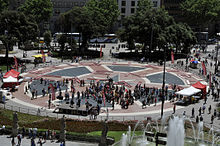Criticism of Coca-Cola
In 1909, the Pure Food and Drug Act passed, and the United States government seized 40 barrels and 20 kegs of Coca-Cola syrup because they considered the added caffeine to be a harmful ingredient.
However, there's one such approved food additive substance, abietic acid – as the chief component of rosin gum used by Coca-Cola – that has been shown to be a potent hormone inhibitor[3] with research linking it to autism[4] and obesity.
[8] Coca-Cola Co. partially funded the pro-industry advocacy group International Life Sciences Institute (ILSI) for many years prior to ending their support for the organization in 2021.
[10] The organization promotes physical activity rather than dietary changes to address obesity, taking a position similar to Coca-Cola Co.-funded research and messaging.
[15] On May 31, 2014, Plataforma per la Llengua, recalling the act of the December 12, 1993, collected over 40,000 Coca-Cola cans for making a mosaic with the letters "Etiqueteu en Català!"
[16] In April 2005, the Kerala High Court[17] rejected water use claims, noting that wells there continued to dry up last summer, months after the local Coke plant stopped operating.
Further, a scientific study requested by the court found that while the plant had "aggravated the water scarcity situation," the "most significant factor" was a lack of rainfall.
[20] In the investor summit held in Indore, Madhya Pradesh in 2016, the state government allocated land for Coca-Cola plant at Babai in Hoshangabad.
In order to stop the project, residents started a signature campaign to garner support for the cause and passed a resolution against the company.
[23] In January 2017, Tamil Nadu Vanigar Sangangalin Peramaipu (TNVSP) called for its members to stop selling Coca-Cola and PepsiCo products to show solidarity with local farmers who had complained about groundwater depletion caused by these companies.
TNVSP consists of over 6,000 local trade associations covering about 1.5 million (15 Lakh) traders across Tamil Nadu, a southern Indian state.
[26][27][28][29] The head of sustainability Bea Perez has said they will continue to use plastic, stating "customers like them because they reseal and are lightweight" and that they create a lower carbon footprint than aluminum and glass bottles.
[39] In 2007, the Coca-Cola Company announced it would no longer conduct or directly fund laboratory experiments on animals unless required by law to do so.
Some experimenters have criticized PETA's campaign against Coca-Cola and other companies claiming that their work would be stalled if they lost corporate funding.
[41] In June 2005, Coca-Cola in Europe formally agreed to end deals with shops and bars to stock its drinks exclusively after a European Union investigation found its business methods stifled competition.
However, the movement in the U.S. demanded full divestiture and did not accept the company's offer to sell a major portion of the holdings to a South African firm.
[50] After democratic elections that produced Mandela's majority rule government, Pepsi sought to re-enter the South African market.
[53] On August 9, 2015, the New York Times published an article that revealed that Coca-Cola had made a large investment in the non-profit called the Global Energy Balance Network, which promoted a scientific solution to the obesity crisis, which was that more exercise rather than cutting back on calories was the way to maintain a healthy weight.
Health experts stated that the non-profit's message was misleading and part of Coke to deflect criticism about the role the company played in the spread of obesity and Type 2 diabetes.
[61][62][63] On March 8, 2022, Coca-Cola announced it would be suspending its business in Russia, stating that "Our hearts are with the people who are enduring unconscionable effects from these tragic events in Ukraine.
"[64] In November 2000, Coca-Cola agreed to pay $192.5 million to settle a class action racial discrimination lawsuit and promised to change the way it manages, promotes, and treats minority employees in the US.
[65][68] In 2003, protesters at Coca-Cola's annual meeting claimed that black people remained underrepresented in top management at the company, were paid less than white employees, and were fired more often.
"[70] In March 2012, 16 workers of color sued Coca-Cola, claiming they had to work in a “cesspool of racial discrimination.”[71][72] In February 2021, recordings of an employee training course were leaked on social media.
"[73] Coca-Cola responded with a statement in March 2021, both clarifying that the leaked documents were not an official part of their training curriculum and apologizing for the incident, claiming "We would never encourage anyone to be any less of themselves.


